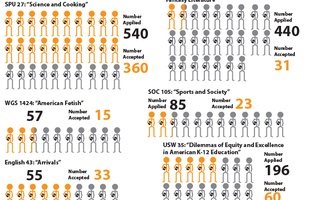As voters in the Commonwealth prepare to head to the polls on Tuesday to choose their parties’ nominees for the state’s open U.S. Senate seat, they will have to consider a number of education platforms ranging from consensus proposals to uniquely bold new ideas.
Though Massachusetts boasts public schools that are consistently ranked among the nation’s best, the five men vying to take Secretary of State John Kerry’s Senate seat have all proposed policies and platforms aimed at correcting flaws in the system. These include efforts to make K-12 education in public schools more effective and initiatives targeting college affordability.
Dems Together
In a campaign that has seen Reps. Stephen F. Lynch of South Boston and Edward J. Markey of Malden disagree on a wide array of issues that include health care, homeland security, and abortion, the two Democratic candidates have promoted largely similar education platforms.
Both men support a bill that would keep the federal student loan interest rate low, at 3.4 percent, and prevent it from doubling to 6.8 percent on July 1. Lynch and Markey also support the Race to the Top program, which provides additional federal education funding to states that adapt certain education policies. Massachusetts, the program’s top scoring state, was awarded $250 million by Race to the Top in 2010.
Both men have also supported education funding and development programs in the past.
In 1998, two years into his first term as a state senator, Lynch helped found the Boston Collegiate Charter School in Dorchester. BCCS serves local students in grades five through 12, and is filled by a lottery with admissions chances under 10 percent—even Lynch’s own daughters did not win a spot. BCCS offers a curriculum that focuses on proficiency in the STEM subjects emphasized by President Barack Obama’s own education platform—science, technology, engineering, and math. Since the school’s founding, 100 percent of BCCS graduates have earned admission to college, according to the school’s website.
Markey has also made notable contributions to education. Perhaps the most recognizable is the E-Rate program, a provision in the Telecommunications Act of 1996, which Markey co-authored. The legislation has provided billions of dollars to schools looking to embrace basic connectivity technology.
Additionally, he has received endorsements from a number of education-driven groups, including the Massachusetts Teachers Association and the National Education Association.
Divided GOP
The landscape on the Republican side is far different. While all three candidates—State Rep. Daniel B. Winslow, former U.S. Attorney Michael J. Sullivan, and former US Navy Seal Gabriel E. Gomez—told The Crimson that they support keeping the federal student loan interest rate low, they have also outlined markedly different visions of education reform.
Winslow’s proposal for a new national lottery is the most bold. Revenue collected from lottery ticket sales would be directed to fund large increases in federal education support, including a doubling in the value of federal merit scholarships from $20 billion a year to $40 billion.
“This is really an effort to create an additional revenue source that is not debt-driven,” Winslow told The Crimson last week. “I want our students to be able to get through college and not be totally burdened by debt.”
The Winslow plan also targets the university system as a whole and particularly the increase in tuition costs, which have historically outpaced inflation. The plan would require universities that receive federal funding to keep a student’s tuition cost consistent with inflation for her four years at the school.
Despite Winslow’s ambitious objectives, Paul Moore, campaign manager for Sullivan, said that creating a new lottery is not as easy—or prudent—as it might sound.
Read more in News
Senior Class Committee Announces Class Day Student SpeakersRecommended Articles
-
Hoping for a New HomeThe competition for best House has always been a tumultuous one. Upperclassman housing at Harvard often means more than just ...
-
Lotteried Classes See Low Admission RatesIt is easier to gain early admission to Harvard College than get into a class with Harry Potter on the syllabus. While Harvard College admitted 18 percent of its early applicants in December, Professor Maria Tatar only admitted 10.5 percent of interested students to her class Folklore and Mythology 90i: “Fairy Tales and Fantasy Literature.”
-
 The Housing Lottery: Then And Now
The Housing Lottery: Then And Now -
Few Hit Jackpot In Course LotteriesAs the number of interested students in some already oversubscribed classes continues to grow and Pre-Term Planning data at times fails to accurately predict student interest, professors face the dilemma of how best to accommodate students while still maintaining the quality of their classes.
-
 With Demand for Popular Courses High, Course Lotteries See Low Admissions Rates
With Demand for Popular Courses High, Course Lotteries See Low Admissions Rates -
 The Love Song of An Awkward Prefrosh
The Love Song of An Awkward Prefrosh













